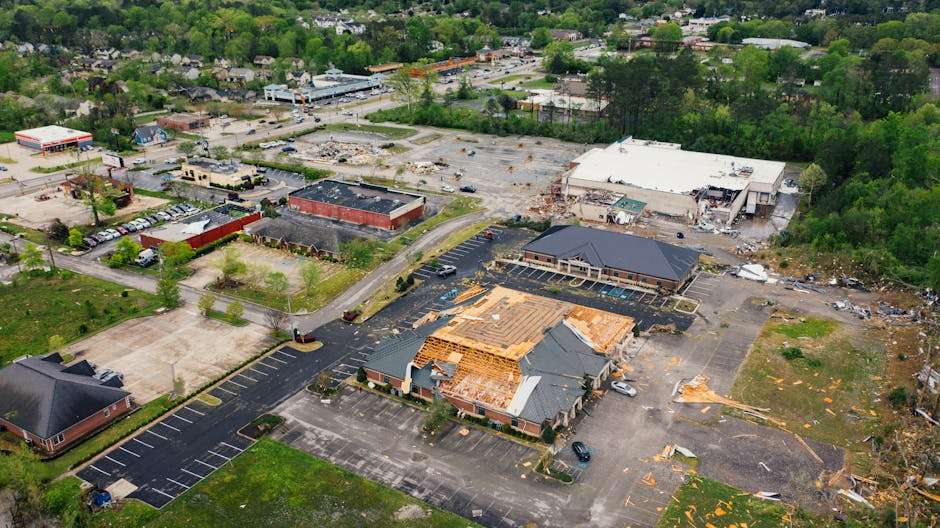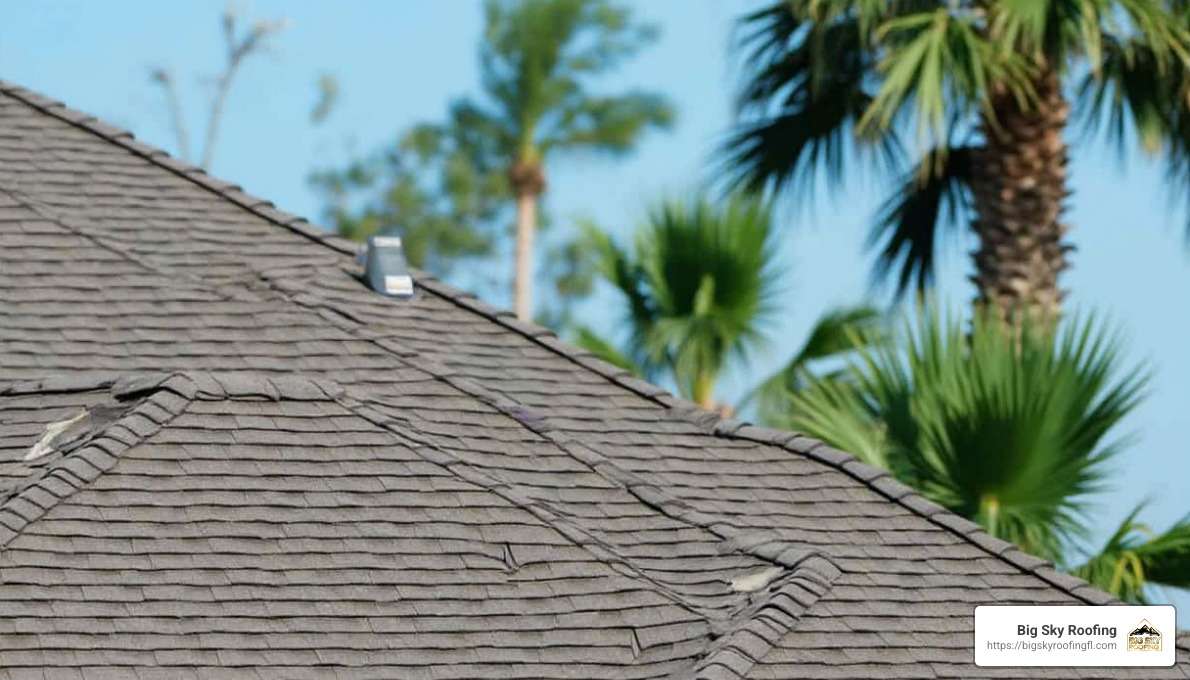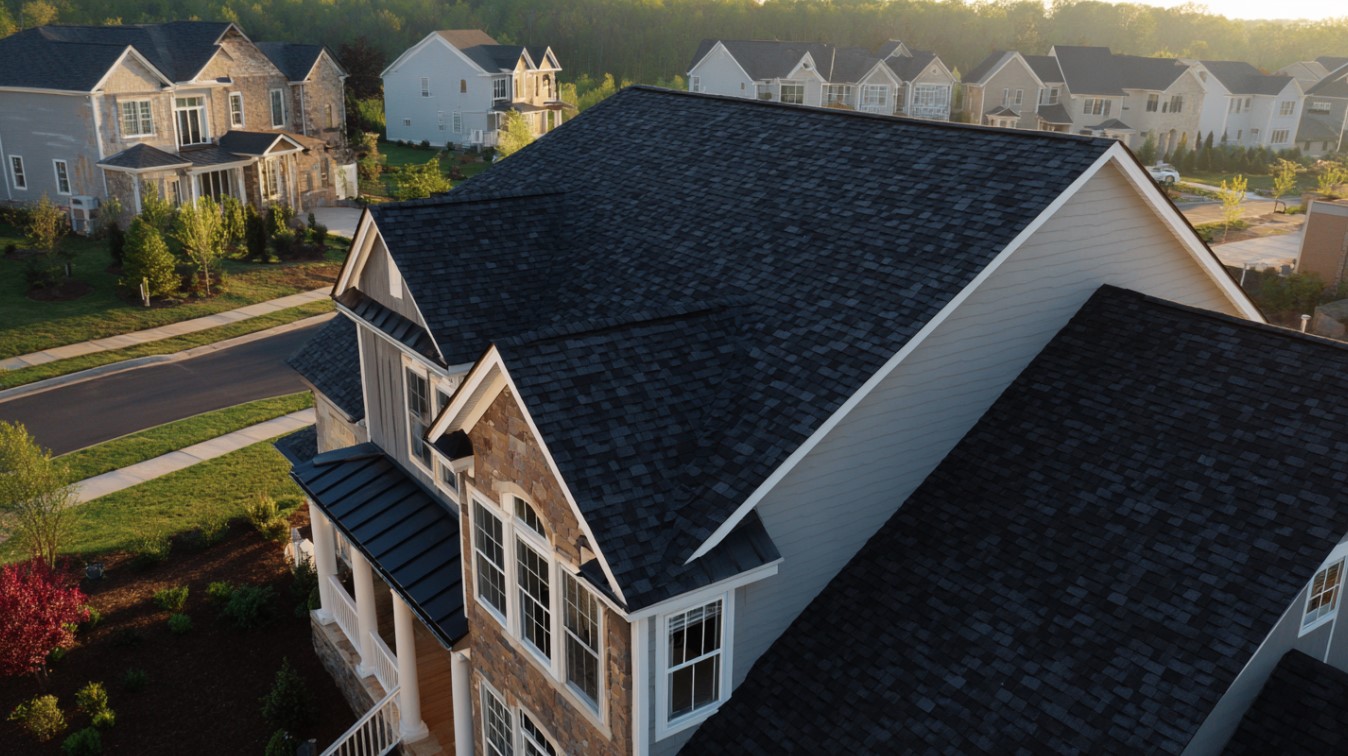Florida Roofing: Navigating the Licensing Labyrinth
•
Written By

Are roofers required to be licensed in Florida? Yes! Florida has stringent roofing laws in place, and securing a roofing license is mandatory for anyone looking to work as a roofer in the state.
Understanding the licensing requirements not only ensures compliance with the law but also safeguards quality and safety standards for roofing projects across Florida’s diverse counties, including Sumter, Lake, Citrus, Hernando, Orange, and Marion.
Florida’s climate, with its intense heat and frequent hurricanes, makes a durable and well-installed roof crucial for homeowners. Navigating the licensing labyrinth is essential for any roofer to offer reliable and lawful services in the Sunshine State.
Big Sky Roofing aims to guide Florida homeowners through the complexities of roofing laws, ensuring their homes remain protected while maintaining their property value.
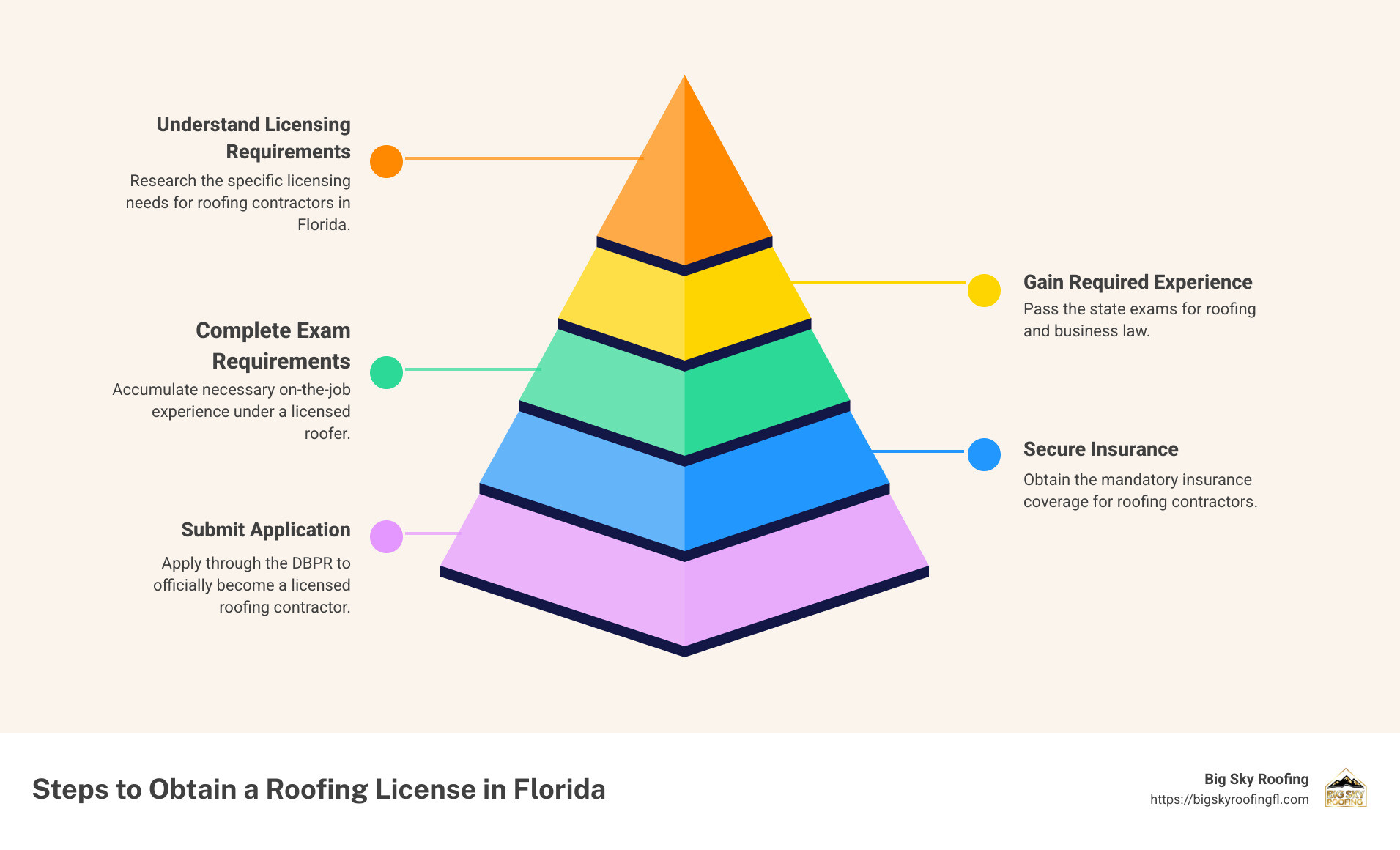
Are Roofers Required to be Licensed in Florida?
Obtaining a Roofing License
In Florida, obtaining a roofing license is not just a formality; it’s a legal requirement. The Department of Business and Professional Regulation (DBPR), in conjunction with the Construction Industry Licensing Board (CILB), oversees the licensing process.
To become a licensed roofing contractor, candidates must pass a state certification exam. This exam tests your knowledge and skills in roofing, ensuring you meet the high standards required for the job. The exam isn’t the only hurdle, though. You also need:
- Experience: A minimum of four years in the roofing industry is required. Alternatively, a combination of college credits and at least one year as a foreman can suffice.
- Insurance: Proof of general liability and workers’ compensation insurance is mandatory. This protects both you and your clients from potential mishaps.
- Background Check: A background check, including fingerprinting, is required to ensure the safety and trustworthiness of contractors.
Once you have all these in place, you can apply for your license through the DBPR. That maintaining your license involves staying updated with any changes in regulations and continuing to meet insurance requirements.
Penalties for Unlicensed Roofing
Operating without a license in Florida is a serious offense. If you’re caught working as a roofer without the necessary credentials, you face severe penalties.
- First Offense: It’s considered a first-degree misdemeanor, which can lead to up to one year in prison and a $1,000 fine.
- Repeat Offenders: If you continue to operate without a license, the stakes get higher. It escalates to a third-degree felony, punishable by a $15,000 fine and up to five years in prison.
- State of Emergency Violations: During a state of emergency, unlicensed contracting is taken even more seriously. The penalties are harsher, reflecting the increased risk to public safety.

These penalties underscore the importance of obtaining and maintaining a valid roofing license. For homeowners in Florida, this means peace of mind knowing that their roofing projects are in the hands of qualified professionals. And for contractors, it means operating within the law and building a reputable business in counties like Sumter, Lake, Citrus, Hernando, Orange, and Marion.
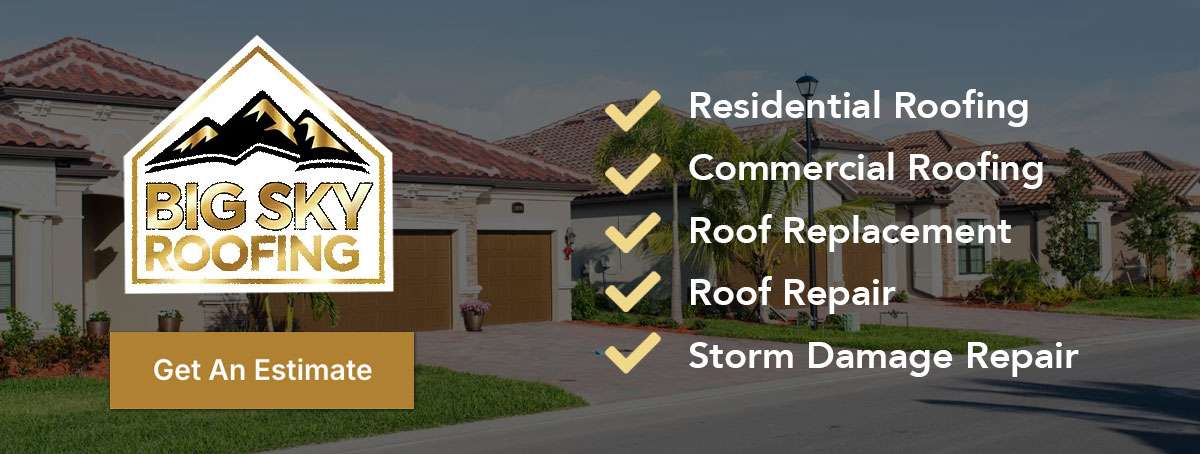
Navigating the licensing process may seem daunting, but it’s a crucial step in ensuring quality and safety in Florida’s roofing industry.
Florida Roofing Laws and Standards
When it comes to roofing in Florida, understanding the laws and standards is crucial. This ensures not only compliance but also the safety and durability of the roofs being installed or repaired.
Roofing Materials and Installation
Building Code and Material Standards
In Florida, all roofing materials must adhere to the strict guidelines set out by the Florida Building Code. This code is designed to ensure that materials can withstand the state’s unique weather conditions, including intense heat and heavy rain.
- Approved Materials: Only materials that meet the Florida Building Code standards can be used. This includes shingles, tiles, metal, and other roofing types that are tested for durability and performance.
- Installation Standards: Proper installation is just as important as the materials themselves. Roofing materials must be installed according to both the manufacturer’s specifications and the building code requirements. This includes the use of specific techniques and tools to ensure the roof’s longevity and resistance to weather extremes.
Hurricane Straps
One critical aspect of roofing in Florida is the use of hurricane straps. These devices secure the roof to the structure, providing extra protection against high winds and storms. They are a mandatory part of the roofing installation process and must be installed correctly to be effective.
Hurricane Roof Damage and Repairs
Storm Damage and Licensed Contractors
Florida’s frequent storms and hurricanes mean that roof damage is a common issue homeowners face. After a storm, it’s crucial to have the roof inspected by a licensed contractor. Only licensed professionals are legally permitted to perform repairs, ensuring that all work meets the necessary standards.
- Licensed Contractors: Hiring a licensed contractor ensures that the repairs are done correctly and safely. They are knowledgeable about the latest building codes and standards and can provide the necessary documentation for insurance claims.
- Storm Damage Inspections: After a storm, roofs must be inspected for damage. This includes checking for loose or missing shingles, leaks, and structural damage. A licensed contractor will assess the damage and recommend the appropriate repairs.
Beware of Unlicensed “Storm Chasers”
After a storm, homeowners might encounter unlicensed individuals offering to repair roofs at low costs. These “storm chasers” often perform subpar work that doesn’t meet Florida’s strict standards. It’s essential to verify the contractor’s license through the DBPR website to ensure you’re working with a qualified professional.
In summary, understanding and adhering to Florida’s roofing laws and standards is essential for both contractors and homeowners. It ensures that roofs are safe, durable, and capable of withstanding the state’s challenging weather conditions.
Frequently Asked Questions about Florida Roofing Licenses
Do You Need a License to Do Roofing in Florida?
Yes, you absolutely need a license to legally perform roofing work in Florida. The state requires all roofers to be licensed to ensure quality and safety in roofing projects. This licensing is overseen by the Department of Business and Professional Regulation (DBPR) and the Construction Industry Licensing Board (CILB).
To obtain a roofing license, you must pass a state certification exam, have relevant experience, and meet insurance requirements. This applies to all counties, including Sumter, Lake, Citrus, Hernando, Orange, and Marion. Without a license, you could face severe penalties, including fines and even criminal charges.
How to Verify a Roofer’s License and Insurance?
Verifying a roofer’s license and insurance is crucial before hiring them for any project. You can easily do this by visiting the DBPR website. Here’s how:
- License Lookup: Use the DBPR’s online license lookup tool. Enter the contractor’s name or license number to verify their credentials.
- Check Insurance: Ask the contractor for proof of insurance. Ensure they have both general liability and workers’ compensation insurance to protect you and your property.
By verifying these details, you ensure that the roofer is qualified and legally allowed to work in Florida, providing peace of mind and protection from potential scams.
What is the New Law for Roofers in Florida?
Florida has introduced new laws to further regulate roofing practices, especially during emergencies. One significant update is related to contract cancellations during a state of emergency.
Under this new law, homeowners have a three-day period to cancel a contract without penalty if it was signed during a state of emergency. This law helps protect consumers from being pressured into quick decisions by contractors during stressful times.
These changes aim to safeguard homeowners and ensure that roofing work is done legally and to high standards. Always stay informed about the latest regulations to protect your rights and property.
Conclusion
In roofing, Big Sky Roofing stands out as a leader in Florida, thanks to our commitment to quality and customer satisfaction. With over 25 years of experience, we pride ourselves on being a licensed and insured roofing company. This ensures that all our projects meet the highest standards of safety and craftsmanship.
Our team of experts is dedicated to providing superior service across Sumter, Lake, Citrus, Hernando, Orange, and Marion counties. We understand the importance of hiring licensed contractors to ensure your roofing project is completed efficiently and safely. By choosing us, you’re not only ensuring compliance with Florida’s stringent roofing laws but also investing in the superior craftsmanship that we are known for.
Whether it’s repair, restoration, or replacement, we’ve got you covered. Our approach is simple: we listen to your needs, plan carefully, and execute with precision. This dedication to excellence has earned us numerous repeat customers and referrals, highlighting our reputation as a trusted roofing partner in Florida.
For anyone looking to start a roofing project, licensing and quality go hand in hand. Choose a company like Big Sky Roofing that values both.
For more information about our services or to get started on your next roofing project, visit our services page. We’re here to help you steer the complexities of roofing with ease and confidence.

